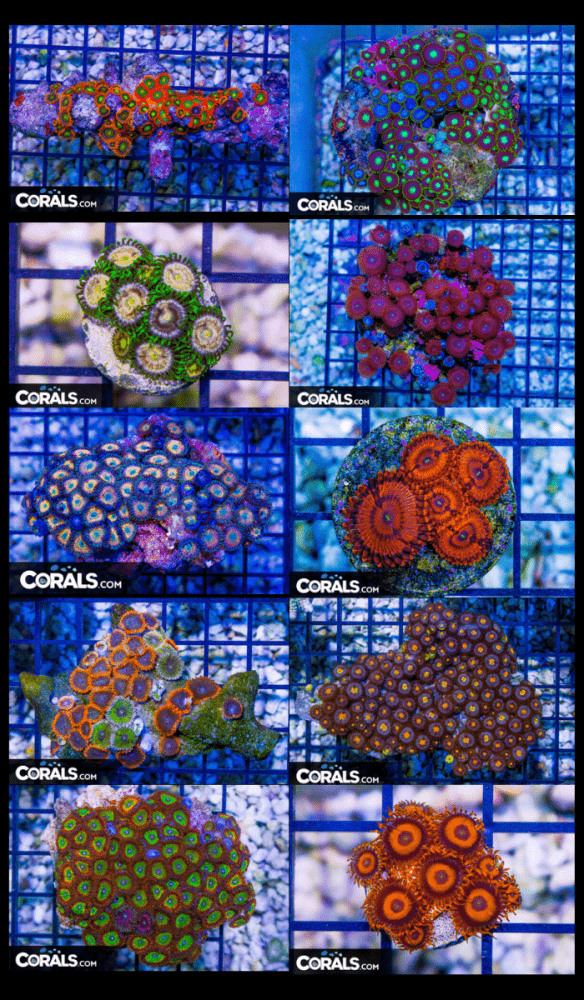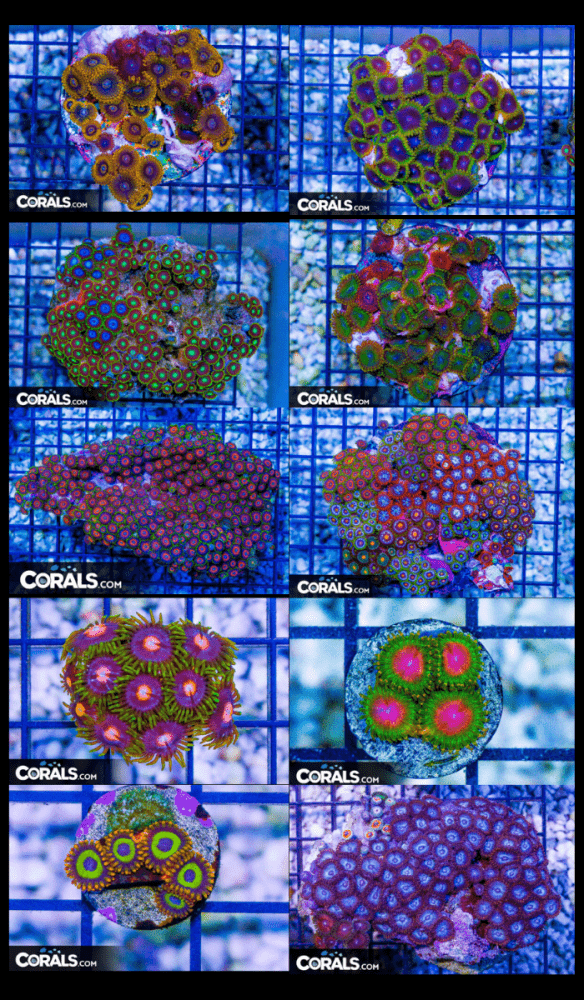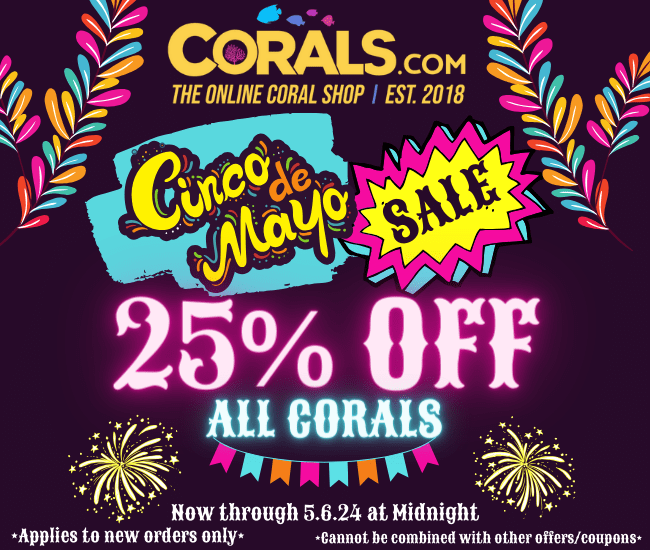- Location
- Warren, OH
Happy Saturday Everyone!
It's Spotlight Saturday where we go more in depth on some of the favorite and most
rewarding corals in the aquarium hobby! Today we're going to cover
one of the most well known and sought after corals, Zoanthids!
It's no surprise that with their vibrant colors, limitless varieties and unique growth patterns,
that they have long been favored amongst all levels of aquarium enthusiasts! This captivating coral,
often referred to as zoas or button polyps, will not only add a huge splash of color to your tank,
but they are considered one of the hardiest and easy to care for corals, no matter what level reefer
you may be. They are quite tolerant to parameter swings to an extent, which makes them a great
option for first time reefers that are still dialing levels in and getting a hang of coral husbandry.
Zoanthids are found in various marine habitats from temperate waters to tropical reefs.
They are mostly found in shallow depths with plenty of sunlight and nutrient rich water,
where they thrive in symbiosis with zooxanthellae, which is photosynthetic algae.
This algae provides the zoas with much of their nutritional requirements through photosynthesis,
giving them their vibrant colors. They're also very good at filter feeding with their flowing tentacles,
catching smaller bits of food, then closing up like a "button" to feed.
Place zoanthids in areas that receive moderate to higher water flow, which allows them to get nutrients
efficiently and for waste to be taken away. It also allows for the removal of detritus and algae films that
may build up on the polyps, which is why adequate flow is key to their health. They can also handle a
variety of lighting spectrums from lower to higher lighting, making them quite versatile.
Feeding zoanthids is always a fun and rewarding experience. While they will acquire a good amount
of nutrients from your water column and photosynthesis, it is also best practice to target feed
them as well. Using a pipette or turkey baster, feed each individual polyp directly with finer foods.
We like to broadcast feed all of our tanks with the larger foods, then feed the zoas the smaller/finer
foods that are left. We'd recommend feeding them 2 times per week for best long term health and
growth. Zoas can be susceptible to pests, so it's best to dip this coral periodically or when the
need arises. Checkout some more info on zoa care HERE.
They are hands down one of the best corals that offer a colorful display, especially when put into
small or larger groups and are allowed to grow together into "gardens". They are a very peaceful
and non aggressive coral, coexisting with a wide range of corals, fish and invertebrates. They are
also easy to propagate through fragmentation! They grow & reproduce at a relatively fast pace and
are great to share/trade with other hobbyists making them a very sustainable coral in the hobby.
If you do decide to frag zoas, we'd recommend wearing gloves and using eye protection.
Don't touch your eyes or face after cutting/handling them and always wash your hands after.
While not very common, some zoa species can contain Palytoxin, which can be harmful to your health.
It's best to treat them all the same and use caution. We've handled, fragged and grown thousands
upon thousands of zoas without issue, but it's always best to handle them with care.
See more info on coral fragging HERE
Zoanthids reproduce both asexually and sexually. Asexual reproduction involves the process of budding,
which is when the coral grows a new polyp, which then detaches itself to form an individual polyp.
Sexual reproduction involves spawning events where male and female polyps release their egg and sperm,
which is triggered by things such as water temps and lunar cycles. Free swimming larvae then
settle in new areas where they will attach and grow into new corals.
Zoanthids are one of the most rewarding, easy to care for, non-agressive, extremely hardy,
easy to propagate, great for all levels of aquarium hobbyists, corals out there! They certainly add a
splash of color to your aquascape as well! Check out some of the zoanthids we have on the site right
now below and feel free to let us know if you have any questions about them. We hope you have a
great weekend as well, and don't forget to checkout our Cinco De Mayo Sale that ends on 5/6!
All corals, including zoanthids, are 25% off right now!



It's Spotlight Saturday where we go more in depth on some of the favorite and most
rewarding corals in the aquarium hobby! Today we're going to cover
one of the most well known and sought after corals, Zoanthids!
It's no surprise that with their vibrant colors, limitless varieties and unique growth patterns,
that they have long been favored amongst all levels of aquarium enthusiasts! This captivating coral,
often referred to as zoas or button polyps, will not only add a huge splash of color to your tank,
but they are considered one of the hardiest and easy to care for corals, no matter what level reefer
you may be. They are quite tolerant to parameter swings to an extent, which makes them a great
option for first time reefers that are still dialing levels in and getting a hang of coral husbandry.
Zoanthids are found in various marine habitats from temperate waters to tropical reefs.
They are mostly found in shallow depths with plenty of sunlight and nutrient rich water,
where they thrive in symbiosis with zooxanthellae, which is photosynthetic algae.
This algae provides the zoas with much of their nutritional requirements through photosynthesis,
giving them their vibrant colors. They're also very good at filter feeding with their flowing tentacles,
catching smaller bits of food, then closing up like a "button" to feed.
Place zoanthids in areas that receive moderate to higher water flow, which allows them to get nutrients
efficiently and for waste to be taken away. It also allows for the removal of detritus and algae films that
may build up on the polyps, which is why adequate flow is key to their health. They can also handle a
variety of lighting spectrums from lower to higher lighting, making them quite versatile.
Feeding zoanthids is always a fun and rewarding experience. While they will acquire a good amount
of nutrients from your water column and photosynthesis, it is also best practice to target feed
them as well. Using a pipette or turkey baster, feed each individual polyp directly with finer foods.
We like to broadcast feed all of our tanks with the larger foods, then feed the zoas the smaller/finer
foods that are left. We'd recommend feeding them 2 times per week for best long term health and
growth. Zoas can be susceptible to pests, so it's best to dip this coral periodically or when the
need arises. Checkout some more info on zoa care HERE.
They are hands down one of the best corals that offer a colorful display, especially when put into
small or larger groups and are allowed to grow together into "gardens". They are a very peaceful
and non aggressive coral, coexisting with a wide range of corals, fish and invertebrates. They are
also easy to propagate through fragmentation! They grow & reproduce at a relatively fast pace and
are great to share/trade with other hobbyists making them a very sustainable coral in the hobby.
If you do decide to frag zoas, we'd recommend wearing gloves and using eye protection.
Don't touch your eyes or face after cutting/handling them and always wash your hands after.
While not very common, some zoa species can contain Palytoxin, which can be harmful to your health.
It's best to treat them all the same and use caution. We've handled, fragged and grown thousands
upon thousands of zoas without issue, but it's always best to handle them with care.
See more info on coral fragging HERE
Zoanthids reproduce both asexually and sexually. Asexual reproduction involves the process of budding,
which is when the coral grows a new polyp, which then detaches itself to form an individual polyp.
Sexual reproduction involves spawning events where male and female polyps release their egg and sperm,
which is triggered by things such as water temps and lunar cycles. Free swimming larvae then
settle in new areas where they will attach and grow into new corals.
Zoanthids are one of the most rewarding, easy to care for, non-agressive, extremely hardy,
easy to propagate, great for all levels of aquarium hobbyists, corals out there! They certainly add a
splash of color to your aquascape as well! Check out some of the zoanthids we have on the site right
now below and feel free to let us know if you have any questions about them. We hope you have a
great weekend as well, and don't forget to checkout our Cinco De Mayo Sale that ends on 5/6!
All corals, including zoanthids, are 25% off right now!








